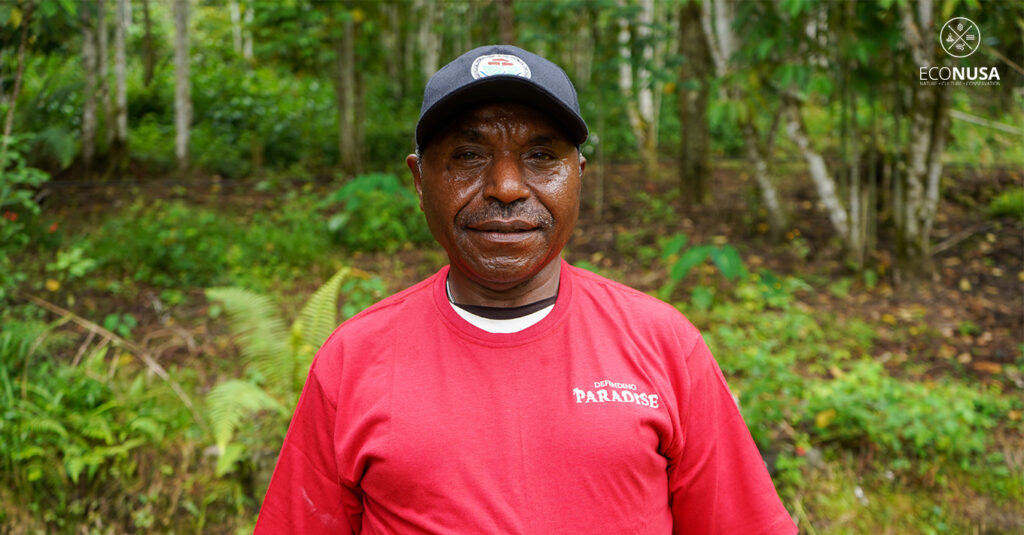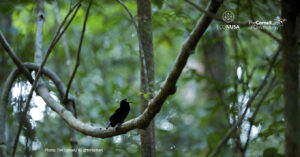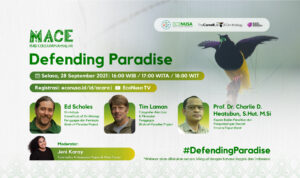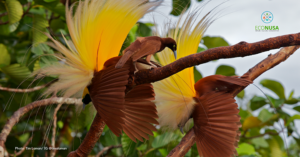A white man yelled amidst the dense jungle in Syoubri Village in the former Irian Jaya Province (that is now called West Papua Province). The man looked for Zeth Wongor, a youngster living in a small hut in the jungle. When found, they stared each other. Breaking the silence, the white man spoke briefly, “I want to stay with you because I want to look for bird.” Their encounter was then deemed the onset of ecotourism at Arfak Mountain.
The white man was David Gibbs, an English ornithologist. Zeth recalled the first meeting with Gibbs and shared his memory to EcoNusa on 22 June 2021. According to Zeth, Gibbs explored up through to the far east country to study bird-of-paradise. Bird-of-paradise had long become the tittle-tattle among peoples. Its charm had been gossiped by Bacan Sultanate, Malay traders, scientis Alfred Russle Wallace, Spanish Kingdom, up through Portuguese adventurers. From this hearsay, the fame to myth of bird-of-paradise with its striking feather was spreading since then on.
Gibbs went on foot 62 kilometers away from Manokwari to Syoubri Village. At the time in 1990, there was no decent road for land transportation. Gibbs presence got unwelcome response. The locals of Syoubri had been traumatized by foreigners following the war among Dutch and Japanese armies. Having explained his purpose, the locals suggested Gibbs to see Zeth Wongor.
Read also: Captivated by Enchanting Bird-of-Paradise
Zeth Wongor knowledge on forest and fauna was above average. He could recognize various sounds of bird-of-paradise, their playground, and signalling sound of the bird-of-paradise. Arfak people believes that bird-of-paradise has never mistakenly told the weather condition.
Gibbs got his talent when he lived in the jungle. Meanwhile, Zeth decided not to continue his elementary education and live remotely alone in the jungle. He built a traditional house of Arfak tribe on the outer areas and started gardening. For survival, Zeth ate various animals.
Zeth could recognize various sounds of bird-of-paradise, their playground, and signalling sound
Zeth agreed Gibbs’ offer. There were also two other porters bringing camera bags and tripod for Gibbs. Both documentation tools had raised queries to Zeth’s mind. He assumed the tripod as weapon. “We did not know tripod function. Is it for shooting? Long cameras are what for. Are there any bullet to shoot bird?” Zeth was wondering.
Zeth kept silence with his presumption and worries due to the absence of Gibbs’ explanation. He spoke a little Bahasa Indonesia. The silence went on until Gibbs arrived at Zeth’s traditional house. There were feathers of many kinds of birds used by Zeth to create arrows. “I thought he would eat birds like this,” he said.
Read also: Protecting Papua and Maluku Forests Not Only About Birds-of-Paradise Preservation
Early in the morning they went deep into the jungle. Zeth left the arrows at home. He only brought machete to pave the way and noken as container for bird he hunted for lunch and dinner. Along the way, Gibbs got mad every time Zet cut off tree branches obstructing their way. Zeth Wongor was confused.
They met a flock of birds enjoying food on a large tree. Gibbs stayed still. There was no gun sound and no bird fell off. Zeth and the porters did not have any idea of what happened. But Zeth realized that no bird would mean no food. He flunk stones that made the birds went away. Gibbs wondered why he did that action.
“He asked who shot. I told him it was me. Because if you did not shoot, I wonder what we would eat if you just keep looking. He said all should have a seat. All should sit down. He only knew a little about Bahasa Indoensia,” said Zeth. Going back to the jungle, they saw a pigeon walking on the ground. Zeth and the other porters went around and throwing something at it. Gibbs shouted, “No way!”
Read also: Igya Ser Hanjop, Arfak Tribe’s Ecological Management
Then they arrived at the Parotia Arfak (Parotia sefilata). Zeth had created a hut to watch Parotia dancing at a closer look. The dancing is performed when mating season is coming. Gibbs entered the watching hut leaving Zeth and other porters to wait outside. Gibbs’ shutter moved quickly with specific sound. Zeth thought it was an arm explosion. Suddenly he approached Parotia. Upon seeing Zeth’s reaction, Gibbs shook his head and so did Zeth in response. Unfortunately, both gestures did not give similar meanings.
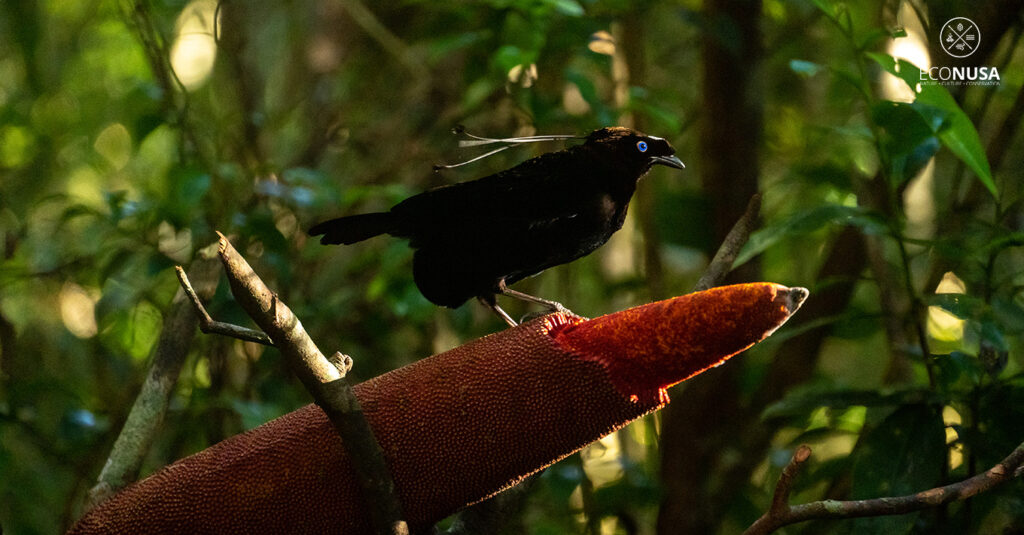
“Back to my house, he paid me for my work. ‘What work, I thought. You did not allow me to cut off trees. So, we did not work today. We just took a walk.’ Then he replied, ‘No, you brought my luggage and guided me in the jungle,” recalled Zeth. He refused Gibbs money because he thought that the shop was far away from his residence. Gibbs exchanged the money into food.
The engagement opened new opportunity to Zeth Wonggor and David Gibbs. Zeth came to know about tourist guide. Without bringing any weapon to kill animals, he could earn for living. Meanwhile, David Gibbs’ arrival to Arfak could provide him materials for his 50-page paper on the manual for birdwatching supporters. Following the meeting with Zeth, he wrote,” To watch bird surrounding Mokwam, you should hire Zeth Wongor, a hunter who turned to be a tour guide with unbeatable knowledge.”
Editor: Leo Wahyudi


